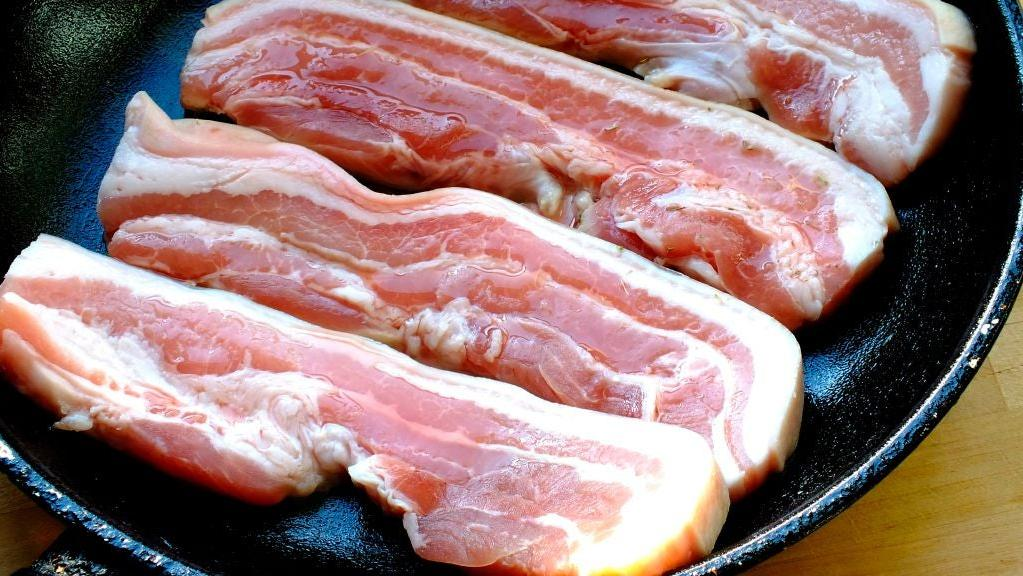What's The Difference Between Cured And Uncured Bacon?
What do these labels on bacon packages mean? Is one type better than the other?
The bacon selection at any typical grocery store is expansive, to say the least. You might encounter varieties like thick-cut, hardwood-smoked, center cut, low-sodium, and both "cured" and "uncured" bacon. However, by definition, bacon is a cured meat. So what does it mean when you see "uncured bacon" on the package label?
The truth is that "uncured" bacon is, in fact, cured—but it's cured slightly differently than regular bacon. Needlessly confusing? You bet! It's a distinction that's lost on the average consumer, and it bears some explanation. It would scarcely be worth all this trouble if we didn't love bacon so much.
What is bacon, even?
Regardless of what the packaging says, every single piece of bacon is "cured." The USDA defines bacon as cured pork belly, and that's it. Merriam-Webster defines it as "a side of a pig cured and smoked." (I guess the folks at the USDA know that smoking is a costly, time-consuming endeavor, so they're willing to let that part slide). As long as the bacon is cured with salt, seasonings, and sodium nitrate, it's all good.
Supermarket standard "cured" bacon is wet cured using synthetic sodium nitrate, which aside from being used as a food preservative is also used as rocket propellant. The sodium nitrate is blended into a brine with salt, sugar, seasoning, and other chemicals, then pumped into pork bellies using industrial injection equipment. Once cured, some bacons are smoked, a process that can take several days, and most are cooked in convection ovens and flavored with liquid smoke, which takes six hours. This bacon is sold cheaply because it's made cheaply.
Bacon, high in sodium and saturated fat, is not exactly the healthiest food. However, it isn't the salt or grease that cause many people to worry about their bacon intake—it's the nitrates and nitrites, which are key preservatives in the bacon-making process. These substances prohibit bacterial growth and keep the meat a vibrant shade of pink instead of oxidizing into a sickly shade of gray.
The problem is, when nitrates are combined with amines (a chemical found in high-protein foods like meat) and cooked at high heat, they form carcinogens called nitrosamines that may increase the risk of certain cancers. And that's why there's been an increased demand for nitrate-free—or "uncured"—bacon.
What’s the deal with uncured bacon?
Uncured bacon does not use synthetically sourced nitrates and nitrites; instead, it uses salt, a bacterial lactic acid starter culture, and natural nitrates derived from vegetables like radishes, beets, and celery.
However, nitrates are nitrates, and no matter where they come from, they will turn into nitrosamines when mixed with protein and cooked over high heat. Cooks Illustrated sent three popular uncured bacons to a lab for analysis, and somehow, bacon made from natural nitrates actually appears to have higher levels of nitrates and nitrites than traditionally cured bacon.
So, is bacon going to kill us all or what?
As with almost all bacon science, it's complicated. There are doctors and researchers who believe you should avoid nitrate-processed meat as much as humanly possible (my children's pediatrician believes feeding kids hot dogs is just as bad as giving them cigarettes), while other experts think the hoopla is overblown. There are studies that say the link between bacon and cancer is indisputable, and ones that say it's inconclusive.
To calm my fears of a bacon-free existence, I asked my friend, food scientist Emily Wagener, to sift through the research on this topic and explain it to me like I was five. She pointed out that there's a very obvious reason the results of these studies appear to be inconsistent.
"If you look closely to see how [the tests] are done in animals, they are literally injecting the stuff into their bodies and seeing what happens at a high dosage," she told me. "In the food industry we frequently wave our arms like a used car lot balloon man and shout our mantra: 'THE DOSE DETERMINES THE POISON.'"
In other words, yes, it's possible that the nitrates in bacon can cause cancer, but you probably need to eat a hell of a lot of bacon to put yourself at risk.
"This is not necessarily a license to eat entire bouquets made of bacon for breakfast, lunch, and dinner, because at that point you'll have different gastrointestinal issues," Emily added. "Bacon is incredibly high in sodium and saturated fat, so (in excess) that'll wreak extra havoc on your intestines long before you potentially get cancer."
There you have it. Eat bacon in moderation, and whatever you do, save the grease for later.
